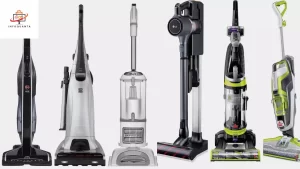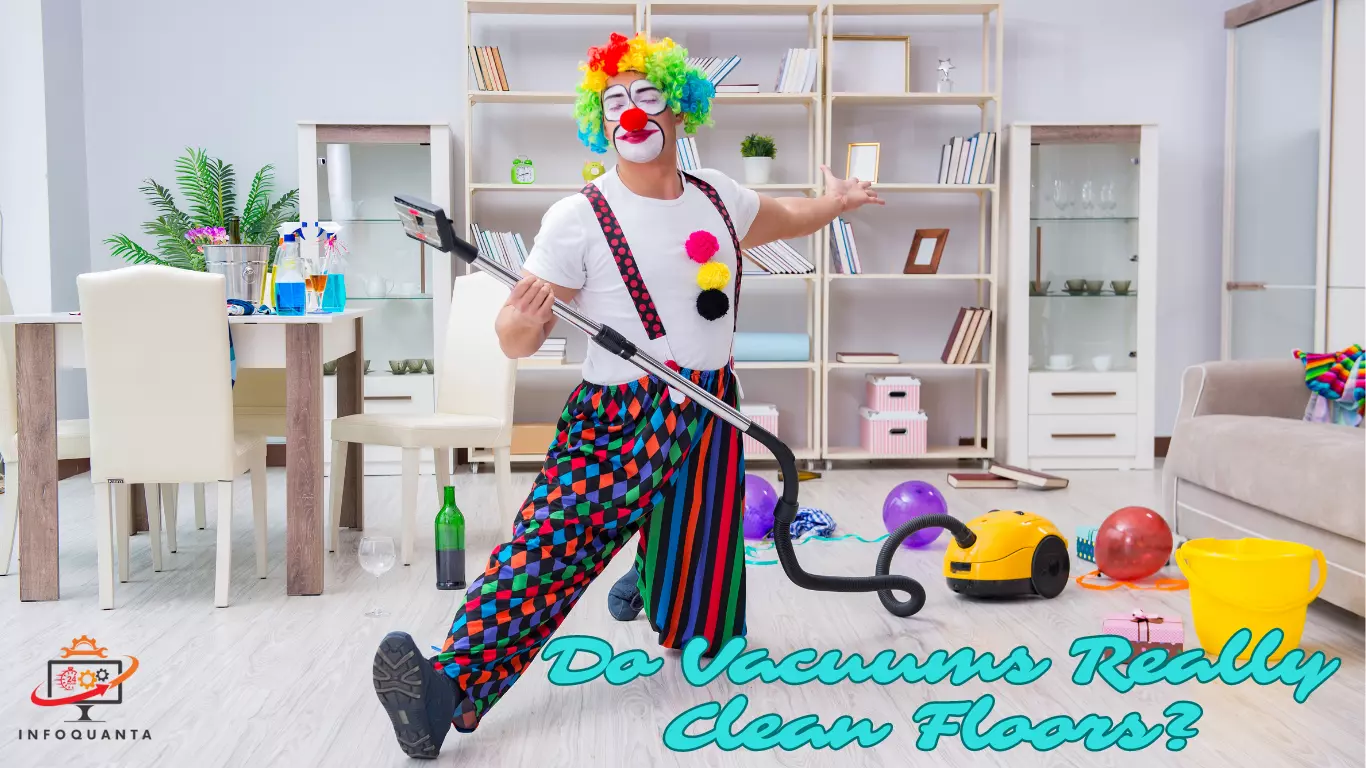Vacuum cleaners have become an indispensable tool in modern household cleaning, promising to eliminate dirt, dust, and debris from various surfaces. Among their primary applications is the cleaning of floors, which are notorious for harboring all sorts of contaminants. But do vacuums truly live up to their promises?
Let’s dive into the science behind how vacuum cleaners effectively clean floors and explore the best options available in the market.
Do Vacuums Actually Clean Floors?
Vacuum cleaners operate on the principle of suction, creating a powerful airflow that lifts dirt and particles from the surface. The effectiveness of vacuum cleaners in cleaning floors depends on several factors:
Suction Power: The strength of the vacuum’s suction determines how effectively it can pull dirt from the floor. High-quality vacuum cleaners are designed with powerful motors that generate strong suction, ensuring a thorough cleaning process.
Brushes and Agitators: Many vacuum cleaners are equipped with rotating brushes or agitators that help loosen dirt and debris from the floor. These brushes agitate the surface, making it easier for the vacuum to pick up particles.
Filtration System: A good filtration system ensures that the vacuum not only picks up visible dirt but also captures microscopic particles like dust mites, allergens, and pet dander. This contributes to a healthier indoor environment.
Surface Compatibility: Different types of vacuum cleaners are designed for specific floor types. For instance, upright vacuums are great for carpets, while canister vacuums excel on hard floors. Some vacuums even have adjustable settings to accommodate various surfaces.
Best Practices for Vacuuming Floors:
To maximize the effectiveness of vacuum cleaners in cleaning floors, follow these best practices:
Preparation: Before vacuuming, clear the area of larger debris and objects that could clog the vacuum or damage its components.
Regular Maintenance: Empty the vacuum’s dustbin or replace the vacuum bag as needed. Regularly clean or replace filters to maintain optimal suction and filtration.
Proper Technique: Slow, deliberate passes with the vacuum allow it to thoroughly clean the floor. Overlapping strokes ensure that no area is missed.
Attachments: Utilize the appropriate attachments for different floor surfaces and hard-to-reach areas. Crevice tools, brushes, and upholstery attachments enhance the vacuum’s versatility.
Best Floor Vacuum Cleaners:

Dyson V11 Absolute Cordless Vacuum:
Features: Powerful suction, intelligent cleaning modes, HEPA filtration, cordless convenience.
Method: Utilizes advanced motor technology for deep cleaning on various floor types. Intelligent sensors adjust suction based on surface.
Shark Navigator Lift-Away Professional NV356E:
Features: Anti-Allergen Complete Seal Technology, swivel steering, brush roll shutoff, lift-away canister.
Method: Lift-Away feature allows you to clean stairs and above-floor areas. HEPA filter traps allergens.
Bissell CleanView Swivel Pet Upright Vacuum:
Features: Triple Action Brush Roll, scatter-free technology, pet hair spooling system.
Method: Specifically designed to handle pet hair and debris. Scatter-free technology prevents debris from scattering while cleaning.
Miele Complete C3 Marin Canister Vacuum:
Features: 6-stage variable speed motor, HEPA AirClean filter, electrobrush with LED lighting.
Method: High-quality German engineering with adjustable settings for different floor types. Electrobrush effectively cleans carpets.
iRobot Roomba i7+ Robot Vacuum:
Features: Smart mapping, self-emptying base, dual multi-surface rubber brushes.
Method: Smart mapping technology ensures thorough coverage. Self-emptying base reduces maintenance frequency.
Hoover Linx Signature Stick Cordless Vacuum Cleaner:
Features: Cordless convenience, WindTunnel Technology, low-profile design.
Method: Lightweight and versatile stick vacuum with edge-cleaning bristles for efficient floor cleaning.
Eureka Mighty Mite 3670G Corded Canister Vacuum:
Features: Lightweight design, multiple attachments, blower port.
Method: Ideal for hard floors and above-floor cleaning. Blower port feature blows debris away for outdoor cleaning.
LG CordZero A9 Ultimate Cordless Stick Vacuum:
Features: Dual interchangeable batteries, Power Punch nozzle, five-step filtration.
Method: Power Punch nozzle agitates carpets for thorough cleaning. Cordless design offers flexibility.
Bissell CrossWave All-in-One Wet Dry Vacuum:
Features: Multi-surface cleaning, dual-action brush roll, smart-touch controls.
Method: Simultaneously vacuums and washes floors. Great for homes with both hard floors and area rugs.
Kenmore Elite 31150 Pet-Friendly Upright Vacuum:
Features: Triple HEPA filtration, Pet Handi-Mate attachment, 3D Inducer Motor.
Method: Powerful suction with HEPA filtration for efficient pet hair removal. Motorized attachment tackles pet hair on furniture.
Frequently Asked Questions (FAQs)
1. Do vacuums really clean floors effectively?
Yes, vacuum cleaners are designed to effectively clean floors by using suction power to lift dirt and debris from various surfaces. The efficiency depends on factors like suction strength, brush technology, and filtration systems.
2. Can vacuuming damage certain types of floors?
Some vacuum cleaners may not be suitable for delicate floors like hardwood or vinyl. It’s important to choose a vacuum with adjustable settings or specialized attachments to avoid scratching or damaging sensitive surfaces.
3. How often should I vacuum my floors?
The frequency of vacuuming depends on factors such as foot traffic, presence of pets, and indoor air quality goals. Generally, high-traffic areas should be vacuumed at least once or twice a week, while less frequented areas may require less frequent cleaning.
4. Should I vacuum before or after mopping?
It’s recommended to vacuum before mopping. Vacuuming removes loose dirt and debris, preventing them from getting pushed around or muddying the water while mopping.
5. Can vacuum cleaners remove pet hair effectively?
Many vacuum cleaners are designed to tackle pet hair with specialized brushes and attachments. Look for models with features like anti-tangle technology and strong suction to effectively remove pet hair from floors.
6. Are bagless or bagged vacuum cleaners better for floor cleaning?
Both bagless and bagged vacuum cleaners have their benefits. Bagless models are convenient as you don’t need to replace bags, while bagged models may be better for those with allergies, as they trap dust and allergens more effectively.
7. What is the significance of HEPA filtration in vacuum cleaners?
HEPA (High-Efficiency Particulate Air) filters capture small particles like dust mites, pollen, and pet dander, improving indoor air quality. Vacuum cleaners with HEPA filters are especially beneficial for allergy sufferers.
8. Can I use the same vacuum on both carpets and hard floors?
Some vacuum cleaners are designed for multi-surface cleaning and can be used on both carpets and hard floors. Look for models with adjustable settings or versatile brush rolls that can switch between different surfaces.
9. Do robot vacuums effectively clean floors?
Robot vacuums are designed to autonomously clean floors by navigating around obstacles and using brushes and suction to pick up dirt. While they may not provide as deep of a clean as traditional vacuums, they are effective for regular maintenance.
10. What maintenance tasks should I perform on my vacuum cleaner?
Regular maintenance includes emptying the dustbin or changing the bag, cleaning or replacing filters, checking for clogs, and inspecting the brush roll for tangled hair or debris. Following the manufacturer’s guidelines ensures optimal performance.
11. Can vacuuming help with allergies and indoor air quality?
Yes, vacuuming with a model equipped with a HEPA filter can significantly improve indoor air quality by trapping allergens and pollutants. Regular vacuuming removes allergens from the environment, making it easier for allergy sufferers to breathe.
12. Do vacuum cleaners come with warranties?
Yes, most vacuum cleaners come with warranties that vary in length and coverage. It’s important to read and understand the warranty terms provided by the manufacturer to ensure proper maintenance and service.
Conclusion:
Vacuum cleaners do indeed clean floors by utilizing a combination of suction power, brushes, and advanced filtration systems. The effectiveness of a vacuum cleaner depends on its design, features, and the user’s proper technique. With the right vacuum cleaner and best practices in place, you can enjoy spotless, debris-free floors that contribute to a healthier and more comfortable living environment.

